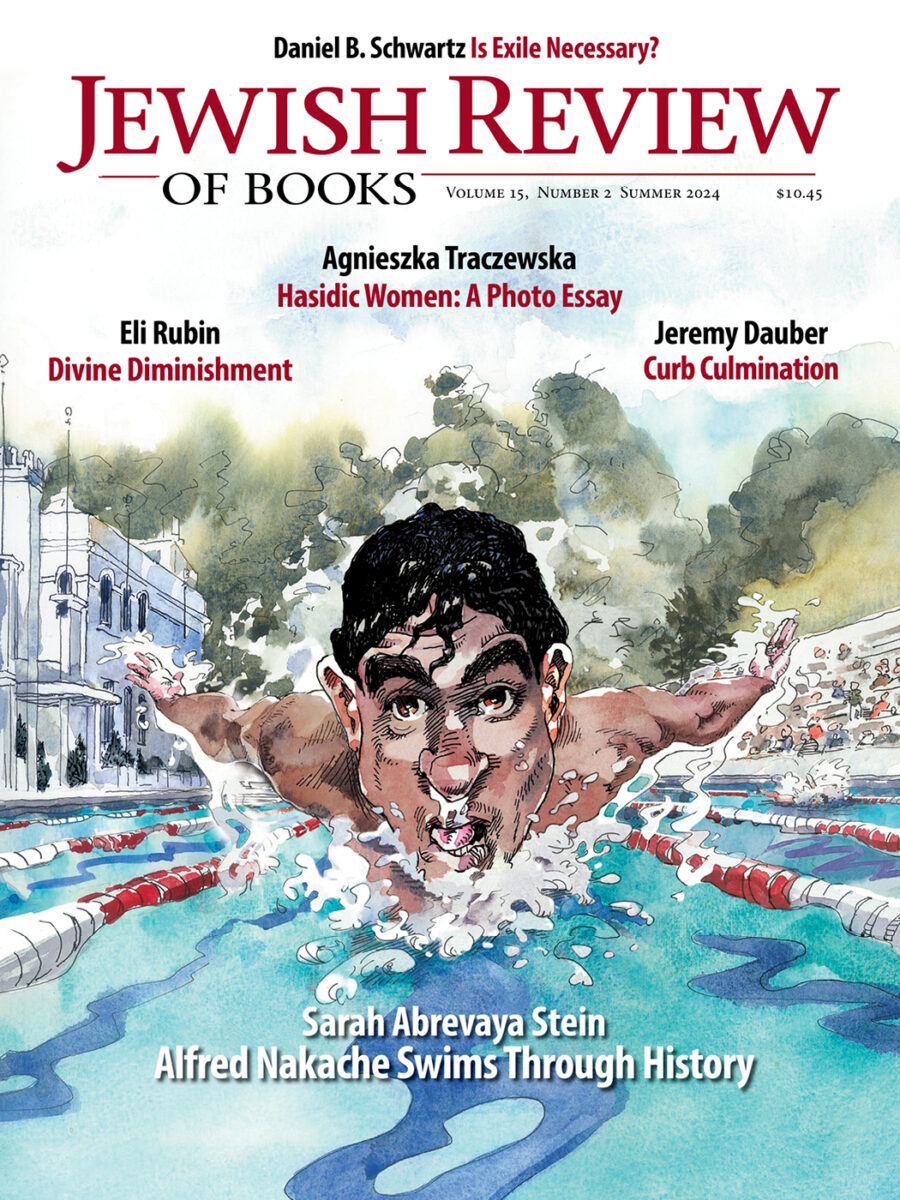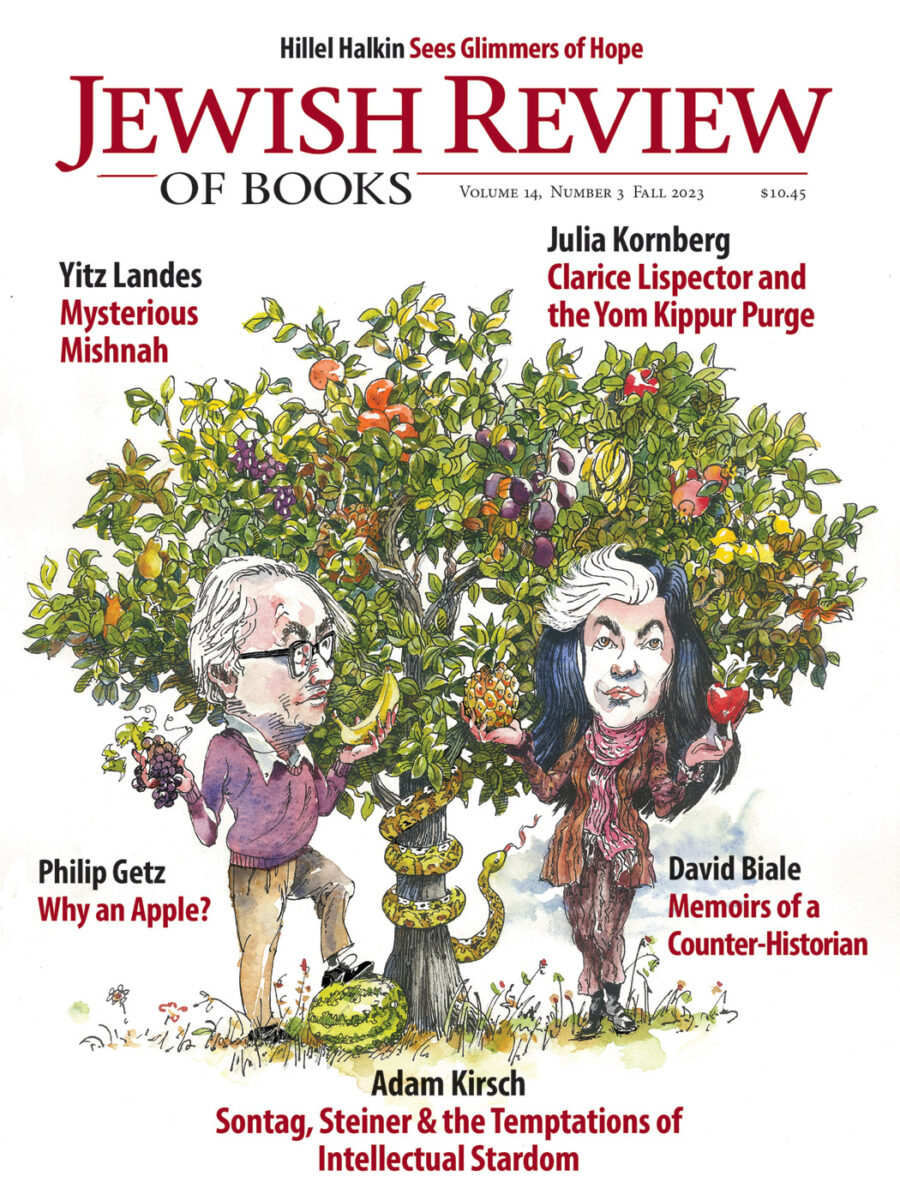Letters
Letters, Fall 2021
We and I; It's a Novel: An Exchange
Reviews
Ten Duel Commandments
Alexander Hamilton was, as the song goes, a “bastard, orphan, son of a whore and a Scotsman.” Was he also a Jew? Well, he did go to Hebrew School in the West Indies, but ...
From Pittsburgh to the Holocaust
Journalist Mark Oppenheimer visited Pittsburgh thirty-two times and conducted 250 interviews to get the story of the Tree of Life massacre right. “Years from now,” Jonathan Sarna writes, “when people want to know what happened … this is the book to which they will probably turn.”
A Maimonides in Monsey
Maimonides’s only son, Abraham, fought to protect his father’s rationalist legacy. Now a direct descendant has republished his works, and a new Maimonidean controversy is percolating in “yeshivish” circles.
Orphan Soldiers
When WW II seemed all but lost, Britain knew that it had to take impossible risks, including turning Jewish refugees into crack commandos.
Persian Daughters of Israel
Leah Sarna imagines Jewish and Gentile women doing their laundry on the banks of the Tigris, sharing tricks for keeping their headscarves tied and their bedrooms pure. She reviews Shai Secunda’s new book on just how Babylonian the Babylonian Talmud was.
How Jews Were Modern
What’s a nice Jewish boy doing making bronze statues of tsars? And does it count as Jewish culture? Ahad Ha’am wanted to know and the Posen Foundation’s ambitious new survey raises the question afresh.
A Tale of Two Exiles
What did a seditious Sicilian duchess and the heretical son of a chief rabbi have to do with the beginnings of French antisemitism?
The First Lady of Zionism
At the age when most of us are just about to fold our tents, Henrietta Szold, pitched hers—and in the Holy Land, no less.
The Russian Joseph
Osip Mandelstam thought being a writer in the Soviet Union was “incompatible with the honorable title of Jew.” Stalin didn’t like Jewish writers in general and disliked the poem about his “cockroach mustache” in particular.
Between Frankfurt and Jerusalem: Scholem, Adorno, and the Fate of the Sacred
When the philosopher Theodor Adorno met Gershom Scholem, he thought that he “gave the impression of a Bedouin prince.” Their lifetime of letters orbits their shared love of their brilliant, doomed friend Walter Benjamin.
Fatal Attraction
Although Martin Heidegger joined the Nazi Party in 1933 and never forthrightly repented of the episode “no other philosopher had more impact on twentieth-century European Jewish thought.”
Do Jews Count?
I would never have said this ten years ago, or even five years ago, but there apparently comes a time in the lives of those who write about Jewish identity when they have to decide whether to write about . . . it.
Readings
The Danish Prince and the Israelite Preacher
Hamlet, Shakespeare’s most peculiar tragedy, echoes one of the most peculiar books in the Hebrew Bible, Ecclesiastes. It also helps us understand its wisdom.
On Chaim Grade’s Agunah
Chaim Grade’s Yiddish novel The Agunah is not so much a story about one woman’s plight as much as a whole city’s eruption over her story—the rabbis, the butchers, the mohels, the barbers, the housewives.
Lost & Found
Cultural Life in the Vilna Ghetto
Abraham Sutzkever, Justin Cammy
The great poet Abraham Sutzkever once swore an oath to serve Yiddish culture. He fulfilled his vow in ways no one could have ever imagined.
Last Word
Depths of Devotion
Aldous Huxley wrote a poem where Jonah was “seated upon the convex mound of one vast kidney” of the fish that swallowed him, while George Orwell gave an interpretation of the Bible story in a review of Henry Miller. Read Stuart Halpern’s romp through Jonah’s reception history.
Past Issues

Issue No. 58
Summer 2024

Issue No. 57
Spring 2024

Issue No. 56
Winter 2024

Issue No. 55